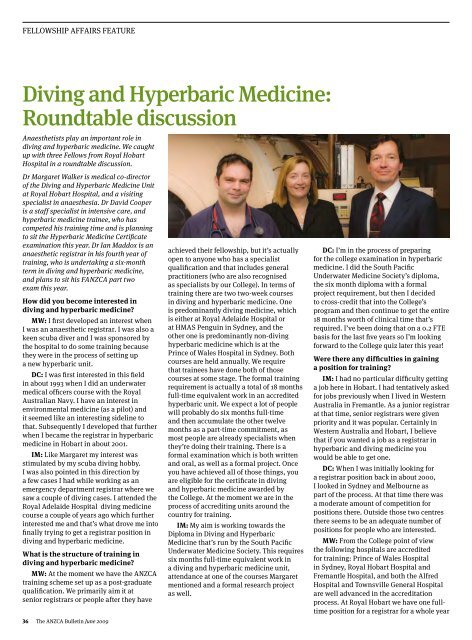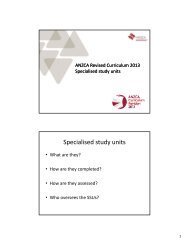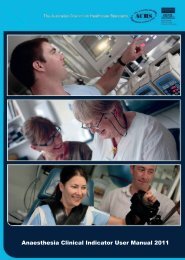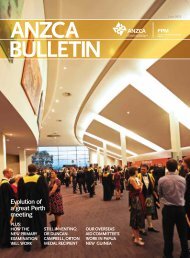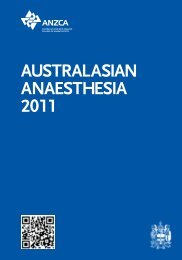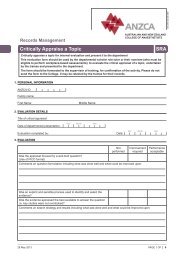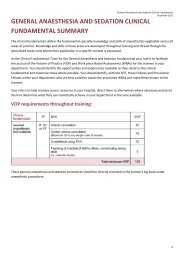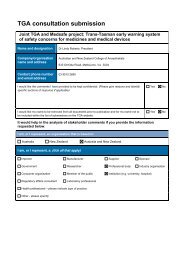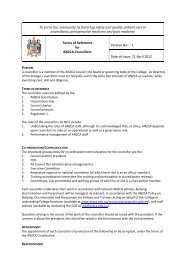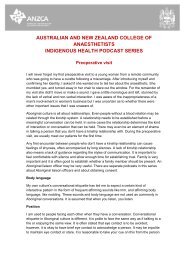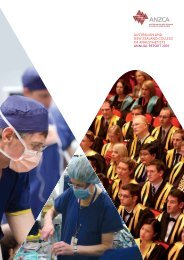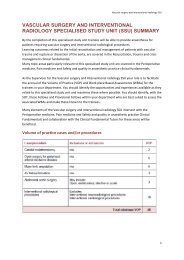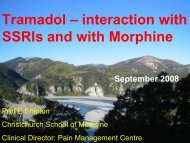ANZCA Bulletin - June 2009 - Australian and New Zealand College ...
ANZCA Bulletin - June 2009 - Australian and New Zealand College ...
ANZCA Bulletin - June 2009 - Australian and New Zealand College ...
- No tags were found...
You also want an ePaper? Increase the reach of your titles
YUMPU automatically turns print PDFs into web optimized ePapers that Google loves.
fellowship affairs featureDiving <strong>and</strong> Hyperbaric Medicine:Roundtable discussionAnaesthetists play an important role indiving <strong>and</strong> hyperbaric medicine. We caughtup with three Fellows from Royal HobartHospital in a roundtable discussion.Dr Margaret Walker is medical co-directorof the Diving <strong>and</strong> Hyperbaric Medicine Unitat Royal Hobart Hospital, <strong>and</strong> a visitingspecialist in anaesthesia. Dr David Cooperis a staff specialist in intensive care, <strong>and</strong>hyperbaric medicine trainee, who hascompeted his training time <strong>and</strong> is planningto sit the Hyperbaric Medicine Certificateexamination this year. Dr Ian Maddox is ananaesthetic registrar in his fourth year oftraining, who is undertaking a six-monthterm in diving <strong>and</strong> hyperbaric medicine,<strong>and</strong> plans to sit his F<strong>ANZCA</strong> part twoexam this year.How did you become interested indiving <strong>and</strong> hyperbaric medicine?MW: I first developed an interest whenI was an anaesthetic registrar. I was also akeen scuba diver <strong>and</strong> I was sponsored bythe hospital to do some training becausethey were in the process of setting upa new hyperbaric unit.DC: I was first interested in this fieldin about 1993 when I did an underwatermedical officers course with the Royal<strong>Australian</strong> Navy. I have an interest inenvironmental medicine (as a pilot) <strong>and</strong>it seemed like an interesting sideline tothat. Subsequently I developed that furtherwhen I became the registrar in hyperbaricmedicine in Hobart in about 2001.IM: Like Margaret my interest wasstimulated by my scuba diving hobby.I was also pointed in this direction bya few cases I had while working as anemergency department registrar where wesaw a couple of diving cases. I attended theRoyal Adelaide Hospital diving medicinecourse a couple of years ago which furtherinterested me <strong>and</strong> that’s what drove me intofinally trying to get a registrar position indiving <strong>and</strong> hyperbaric medicine.What is the structure of training indiving <strong>and</strong> hyperbaric medicine?MW: At the moment we have the <strong>ANZCA</strong>training scheme set up as a post-graduatequalification. We primarily aim it atsenior registrars or people after they have36The <strong>ANZCA</strong> <strong>Bulletin</strong> <strong>June</strong> <strong>2009</strong>achieved their fellowship, but it’s actuallyopen to anyone who has a specialistqualification <strong>and</strong> that includes generalpractitioners (who are also recognisedas specialists by our <strong>College</strong>). In terms oftraining there are two two-week coursesin diving <strong>and</strong> hyperbaric medicine. Oneis predominantly diving medicine, whichis either at Royal Adelaide Hospital orat HMAS Penguin in Sydney, <strong>and</strong> theother one is predominantly non-divinghyperbaric medicine which is at thePrince of Wales Hospital in Sydney. Bothcourses are held annually. We requirethat trainees have done both of thosecourses at some stage. The formal trainingrequirement is actually a total of 18 monthsfull-time equivalent work in an accreditedhyperbaric unit. We expect a lot of peoplewill probably do six months full-time<strong>and</strong> then accumulate the other twelvemonths as a part-time commitment, asmost people are already specialists whenthey’re doing their training. There is aformal examination which is both written<strong>and</strong> oral, as well as a formal project. Onceyou have achieved all of those things, youare eligible for the certificate in diving<strong>and</strong> hyperbaric medicine awarded bythe <strong>College</strong>. At the moment we are in theprocess of accrediting units around thecountry for training.IM: My aim is working towards theDiploma in Diving <strong>and</strong> HyperbaricMedicine that’s run by the South PacificUnderwater Medicine Society. This requiressix months full-time equivalent work ina diving <strong>and</strong> hyperbaric medicine unit,attendance at one of the courses Margaretmentioned <strong>and</strong> a formal research projectas well.DC: I’m in the process of preparingfor the college examination in hyperbaricmedicine. I did the South PacificUnderwater Medicine Society’s diploma,the six month diploma with a formalproject requirement, but then I decidedto cross-credit that into the <strong>College</strong>’sprogram <strong>and</strong> then continue to get the entire18 months worth of clinical time that’srequired. I’ve been doing that on a 0.2 FTEbasis for the last five years so I’m lookingforward to the <strong>College</strong> quiz later this year!Were there any difficulties in gaininga position for training?IM: I had no particular difficulty gettinga job here in Hobart. I had tentatively askedfor jobs previously when I lived in WesternAustralia in Fremantle. As a junior registrarat that time, senior registrars were givenpriority <strong>and</strong> it was popular. Certainly inWestern Australia <strong>and</strong> Hobart, I believethat if you wanted a job as a registrar inhyperbaric <strong>and</strong> diving medicine youwould be able to get one.DC: When I was initially looking fora registrar position back in about 2000,I looked in Sydney <strong>and</strong> Melbourne aspart of the process. At that time there wasa moderate amount of competition forpositions there. Outside those two centresthere seems to be an adequate number ofpositions for people who are interested.MW: From the <strong>College</strong> point of viewthe following hospitals are accreditedfor training: Prince of Wales Hospitalin Sydney, Royal Hobart Hospital <strong>and</strong>Fremantle Hospital, <strong>and</strong> both the AlfredHospital <strong>and</strong> Townsville General Hospitalare well advanced in the accreditationprocess. At Royal Hobart we have one fulltimeposition for a registrar for a whole year


